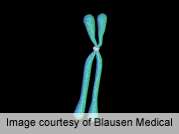(HealthDay)—The functional nonsynonymous single nucleotide polymorphism (rs6318) of the 5HTR2C gene is associated with increased risk of cardiovascular disease mortality and morbidity, according to a study published online Dec. 18 in PLOS ONE.
Beverly H. Brummett, Ph.D., from the Duke University Medical Center in Durham, N.C., and colleagues investigated allelic variation in rs6318 as a predictor of coronary artery disease severity and of a composite end point of all-cause mortality or myocardial infarction (MI) in a cohort of 6,126 Caucasian participants (65.9 percent males).
During a median follow-up of 5.3 years, the researchers identified 1,769 events (1,544 deaths and 225 MIs). In unadjusted models, males hemizygous for Ser23 C and females homozygous for Ser23 C had a significantly increased risk for the composite end point, compared with Cys23 G carriers (hazard ratio, 1.47; P = 0.0008). In males and females, the rs6318 genotype was not associated with body mass index, diabetes, hypertension, dyslipidemia, smoking history, number of diseased coronary arteries, or left ventricular ejection fraction, after adjustment for age. The estimate for the two Ser23 C groups was modestly attenuated after adjustment for these covariates, but remained statistically significant (hazard ratio, 1.38; P = 0.005).
"These findings suggest that this functional polymorphism of the 5HTR2C gene is associated with increased risk for cardiovascular disease mortality and morbidity, but this association is apparently not explained by the association of rs6318 with traditional risk factors or conventional markers of atherosclerotic disease," the authors write.
Copyright © 2013 HealthDay. All rights reserved.























